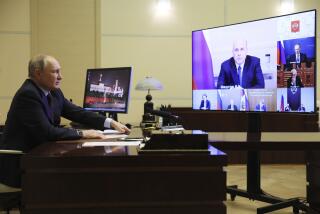France to Resume Nuclear Weapons Tests : Arms: New president announces temporary revival of program, ending 3-year ban. Greenpeace decries the move.
- Share via
PARIS — Citing the “higher interests” of France, President Jacques Chirac decided Tuesday to end his country’s 3-year-old moratorium on nuclear weapons testing and stage eight tests in the South Pacific from September to May, 1996.
The temporary resumption of nuclear testing, strongly recommended by Chirac’s military advisers, is designed to give French scientists the data they need to replace live tests with computerized simulations in the future.
And Chirac told a news conference here that he wants to conclude the tests before the end of next year so France can, as promised, sign an international treaty banning all nuclear weapons tests.
But the new president’s decision, though expected, generated sharp criticism from environmentalists in France and an expression of “disappointment” from senior U.S. officials. It also was likely to create unease in the South Pacific, where there are fears of radioactive pollution from France’s nuclear-test facilities on the Moruroa atoll in French Polynesia.
Chirac’s announcement came hours after Rainbow Warrior II, a protest ship operated by the environmental group Greenpeace, set sail from Auckland, New Zealand, on a mission to stop nuclear testing in the South Pacific.
Ten years ago, the first Rainbow Warrior, on a similar trip to try to halt French nuclear weapons testing, was sunk by French government agents in the Auckland harbor. One Greenpeace activist was killed; two French agents were tried and sentenced to 10 years in prison for manslaughter but were later returned to France.
The Paris office of Greenpeace chided Chirac for his decision, calling it a “black Tuesday for world disarmament” and saying he was crassly trying to “reaffirm the grandeur of France . . . without understanding the real dangers.”
Chirac has publicly opposed the test ban since at least 1992, when then-President Francois Mitterrand suspended nuclear tests. In his presidential campaign, Chirac had said he would consider lifting the moratorium after consulting with experts.
Earlier this month, a panel of military experts urged Chirac to resume testing, concluding that more tests are needed before scientists have enough information to use simulations to modernize France’s nuclear capability. That panel added that laboratory substitutes for nuclear tests must be ready by 2002 and that France is due to begin work next year in Bordeaux on a laser facility designed to simulate nuclear explosions.
Chirac took pains Tuesday to describe the new nuclear work as the “last series of tests” for his country. And he said they are necessary “to assure the safety, reliability and security” of the French nuclear strike capability.
He said “all the civilian and military experts . . . were unanimous in telling me that if we wanted to assure the safety and reliability of our deterrent forces, if we wanted to move to a stage of simulating [nuclear tests] in laboratories, we were obliged to lift the moratorium.” He said the tests in the Pacific would be conducted “in conditions under which there will be no ecological consequences.”
Greenpeace contends that testing has damaged the rock base of the Moruroa and Fangataufa atolls, although the government denies this. And a Greenpeace official said recently that the Rainbow Warrior II, equipped with a crew of 22 and high-tech monitoring and communications equipment, “will do what it can to prevent a resumption of testing in the South Pacific.” Its first port of call will be Papeete, the capital of French Polynesia.
New Zealand, Australia and most South Pacific island nations had called on Chirac not to resume testing. The United States, Britain and Russia already have placed a moratorium on their testing programs.
China is the only other major power that is still testing its nuclear weapons, although it has agreed to work toward a comprehensive test-ban treaty next year.
Chirac is due to meet President Clinton today at the White House, and U.S. officials said the nuclear testing decision will be among a host of matters discussed.
Before making his announcement, Chirac said, he had informed France’s main allies, as well as opposition leaders and the governments of Australia and New Zealand, of his decision. He said his government plans to study closing Albion Plateau, France’s only land-based nuclear missile site, in southern France. If that happens, it would mean that France would only be able to launch nuclear weapons by submarine.
More to Read
Sign up for Essential California
The most important California stories and recommendations in your inbox every morning.
You may occasionally receive promotional content from the Los Angeles Times.














